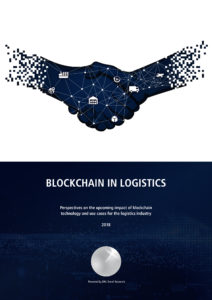 A new report from Accenture and DHL has revealed how blockchain technology has the potential to transform the logistics industry, owing to its ability to address the complex nature of global supply chains.
A new report from Accenture and DHL has revealed how blockchain technology has the potential to transform the logistics industry, owing to its ability to address the complex nature of global supply chains.
The report also includes initial findings on a working prototype developed by DHL and Accenture, which tracks pharmaceuticals from the point of origin to the consumer, preventing tampering and errors.
“The experiments with blockchain in finance are well known, but we believe logistics is an area where the new technology will have a truly profound impact,” said Matthias Heutger, senior vice president DHL Customer Solutions & Innovation. “Implementing productive solutions, however, will require further technological development and, critically, collaboration between all stakeholders.”
Blockchain is a new type of database system that maintains, records and authenticates data and transactions. In supply chains, products are assigned unique identifiers that allow their entire history to be captured as they move to the end customer. Stakeholders validate this information in real time and if anyone tries to tamper with, alter or erase a record, everyone will know.
“We see especially exciting potential for blockchain in pharmaceuticals, which is why we focused our proof of concept with Accenture on the life sciences and healthcare industry,” explained Keith Turner, CIO chief development officer, DHL Supply Chain. “By utilizing the inherent irrefutability within blockchain technologies, we can make great strides in highlighting tampering, reducing the risk of counterfeits and actually saving lives.”
As many as one million lives are lost each year due to counterfeit medications, according to international police organization Interpol, and it is estimated that up to 30% of pharmaceutical products sold in emerging markets are counterfeit. DHL and Accenture created a blockchain-based serialization prototype with nodes in six geographies to track pharmaceuticals across the supply chain. The ledger tracking these medicines may be shared with stakeholders, including manufacturers, warehouses, distributors, pharmacies, hospitals and doctors. Lab simulations show how blockchain could handle more than seven billion unique serial numbers and 1,500 transactions per second.
“We’ve worked closely with DHL to understand and document the broad impact blockchain will have on supply chains of the future,” added Andreas Baier, Accenture lead for the travel and transportation industry and DHL client team leader. “Using a common, indelible and secure ledger, the industry can achieve much higher safety standards from the factory to the patient at much lower cost. This is one of several opportunities blockchain affords to restructure business processes while reducing cost and complexity.”
Blockchain technology shows great promise for dramatically improving the efficiency and reliability of supply chains in all industries. According to the International Data Corporation (IDC), global spending on blockchain solutions is forecast to reach US$2.1bn in 2018, more than double the US$945m spent in 2017. In 2021, annual spending is expected to reach US$9.7bn.
By Hazel King
March 13, 2018

